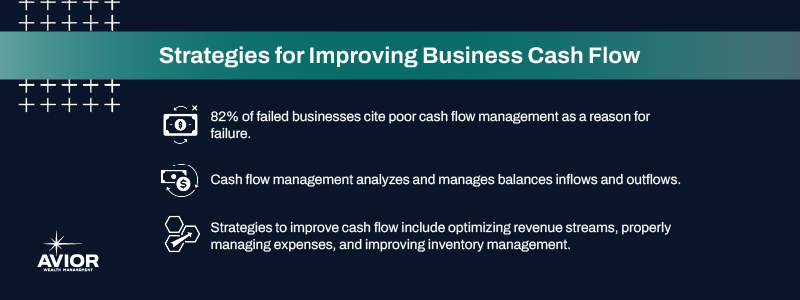Strategies for Improving Business Cash Flow
Businesses commonly fail due to cash flow problems. Learn how to stay proactive with accurate cash flow planning.

Ah, cash flow. The lifeblood of any organization. Proper cash flow planning paves the way to business success, but how exactly do you go about striking that perfect balance between spending and selling?
It’s certainly an important question that poses a huge challenge. According to a study conducted by Jessie Hagen, a former cash collector with U.S. Bank, nearly 82% of small businesses fail due to poor cash flow management skills or a poor understanding of cash flow fundamentals.
Don’t be a statistic. Here, we’ll provide tactics and strategies you can use to improve your business’s cash flow and optimize for long-term growth.
But first, how does cash flow work?
How Cash Flow Works
The two foundational components of business cash flow are:
- Inflows: Cash coming into the business, such as sales revenue; and
- Outflows: Cash going out of the business for expenses such as operating costs.
Analyzing cash flow equates to comparing your expenses to income, or outflows to inflows, to ensure your ledger doesn’t drop into the red. The goal is to maintain a positive cash flow, where inflows are greater than outflows, so you can maintain profitability and growth.
But businesses often fail to manage cash flow properly. Reasons this may happen include:
- Waiting on late customer payments;
- Not having enough cash reserves to cover unexpected expenses;
- High overhead costs;
- Fluctuating customer demand due to seasonal changes; or
- Growing too fast as a new company without enough resources to sustain that growth.
Proper cash flow management can help protect against these issues. Being aware of the market, using historical data, and being consistent can all improve how your business manages and maintains a healthy cash flow.
Strategies for Improving Cash Flow
If you’re anticipating cash flow challenges or are just getting started managing business finances, there are some steps you can take to stay prepared.
1. Optimize Revenue Generation
First, let’s start with the obvious: Analyze whether you’re bringing in enough money as a business.
Address revenue requirements by increasing sales and service offerings, improving your pricing structure, or exploring new revenue streams. Decide whether you need to invest more in marketing and sales tactics to bring on additional customers.
2. Manage Expenses More Effectively
Many businesses improperly forecast or simply don’t manage expenses well. Improve expense management by scrutinizing your budgets and reducing unnecessary spending. Negotiate with suppliers and vendors accordingly.
Implement cost-saving measures within the business to cut back on excessive spending. Put methods in place to track and control expenses each month. Often, simply opening up visibility into expenses goes a long way in improving cash flow management.
3. Improve Inventory Management
Many cash flow issues start with inventory. Some businesses may hold way too much for too long and thus struggle to cover inventory costs without enough revenue to do so.
Relying on data, optimize inventory levels accordingly. Consider upgrading to a more advanced inventory tracking system that provides deeper insights into market trends and patterns.
4. Streamline Accounts Receivable
If late customer payments are weighing down your cash flow, it may be time to revisit how you’re collecting payments.
Implement strategies like sending invoices immediately, offering customer incentives if they pay early, and always following up promptly if payments are overdue.
Look at your payment terms and decide if there’s room to tighten up deadlines to ensure faster payment.
5. Be Strategic With Accounts Payable
On the accounts payable end, use tactics like negotiating more favorable payment terms to strengthen cash flow.
Take advantage of early payment discounts that may help your business save money. Whatever you do, always avoid late payment penalties.
These are added expenses that can easily be prevented with better cash flow planning.
6. Consider Financing Options
Many small businesses decide to pursue financing options to help them cover costs and improve cash flow planning.
Around 34% of small businesses apply for loans to use for business expansion and equipment purchases.
Explore lines of credit if you need temporary assistance. Look at the full range of financing options available, including grant programs, venture capital, and Small Business Administration (SBA) loan options.
Cash Flow Forecasting and Analysis
Properly managing cash flow today and forever starts with having the right financial documents and reports in place. Start with a simple cash flow statement, which reports all inflows and outflows, to view your business’s financial position.
Being thorough with cash flow documentation allows for more accurate forecasting. This is key to understanding revenue sources, expenses, and potential challenges.
Use a digital platform to help you automate the generation of reports, track progress, and monitor cash flow KPIs, including:
- Operating cash flow: Revenue generated from everyday operations;
- Free cash flow: Cash leftover after deducting expenses;
- Cash flow margin: The amount of cash actually received versus expected cash;
- Cash conversion cycle: Ability to turn resources into liquid assets; and
- Working capital: Available liquidity.
Accurate cash flow analysis helps you evaluate where all cash comes from, where all outflows are going, and liquidity information.
This analysis, coupled with your cash flow statement, makes it easier to identify potential issues and make more informed financial decisions.
Improve Your Business Cash Flow With Guidance From Avior
Properly managing cash flow requires consistent monitoring and proactive planning. Knowing the right metrics to track and strategies to improve cash flow can help your business continue growing with a healthy bottom line.
The team at Avior can help you evaluate cash flow and put stronger practices in place for success. We can also help you and your business with succession planning, business acquisition, family business concerns, and much more.
Contact Avior to set up a one-on-one consultation today.
Disclaimer: Nothing contained herein should be construed as legal or tax advice. Avior and our Advisors will work with your attorney and/or tax professional to assist with your legal and tax strategies. Please consult your attorney or tax professional with specific legal and/or tax questions. Investment Management and Financial Planner are offered through Avior Wealth Management, LLC, an SEC-registered investment advisor. Past performance is not a guarantee of future results. Investments are subject to loss, including the loss of principal.
No Comments
Sorry, the comment form is closed at this time.




